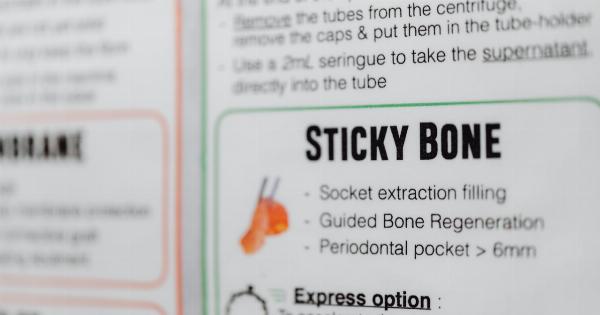Testosterone is a hormone produced by the male reproductive system. It is responsible for the development of male sexual characteristics and is also important for maintaining muscle mass, bone density, and red blood cell production.
However, as men age, testosterone levels naturally decrease. When this decrease becomes too significant, it can lead to a condition known as testosterone deficiency.
What is Testosterone Deficiency?
Testosterone deficiency, also known as hypogonadism or low testosterone, is a condition that occurs when a man’s body does not produce enough testosterone.
This can lead to a variety of symptoms and health problems, including decreased sex drive, infertility, and loss of muscle mass and bone density.
What are the Signs of Testosterone Deficiency?
The signs of testosterone deficiency can vary from person to person, but some common symptoms include:.
1. Decreased Sex Drive
Testosterone plays an important role in sexual function, so one of the most common signs of testosterone deficiency is a decreased sex drive.
Men with low testosterone may find that they have less interest in sex and are less likely to engage in sexual activity.
2. Erectile Dysfunction
Erectile dysfunction, or the inability to achieve or maintain an erection, is also a common symptom of testosterone deficiency. Testosterone helps to stimulate the production of nitric oxide, which is necessary for achieving and maintaining an erection.
When testosterone levels are low, men may experience difficulty getting or keeping an erection.
3. Infertility
Testosterone is also important for sperm production. Men with low testosterone may have a decreased sperm count or may produce sperm that are less motile, which can make it more difficult to conceive a child.
4. Decreased Muscle Mass
Testosterone is necessary for building and maintaining muscle mass and strength.
Men with low testosterone may notice a decrease in muscle mass and an increase in body fat, which can lead to a loss of strength and a decrease in overall physical performance.
5. Decreased Bone Density
Testosterone is also important for maintaining bone density. Men with low testosterone may be at increased risk for osteoporosis, which is a condition that causes bones to become weak and brittle.
6. Fatigue and Lack of Energy
Testosterone helps to regulate energy levels and mood. Men with low testosterone may experience fatigue, lack of energy, and a decrease in overall well-being.
7. Mood Changes
Testosterone plays a role in regulating mood, and men with low testosterone may experience mood swings, irritability, and depression.
8. Sleep Problems
Testosterone is also important for regulating sleep patterns. Men with low testosterone may have trouble falling asleep or staying asleep, which can lead to daytime fatigue and a lack of energy.
9. Decreased Motivation
Testosterone is necessary for motivation and drive. Men with low testosterone may experience a decrease in motivation and may feel unmotivated or uninterested in activities they once enjoyed.
10. Decreased Hair Growth
Testosterone is responsible for the growth of body and facial hair. Men with low testosterone may experience a decrease in hair growth or may notice that their hair is thinning.
Conclusion
Testosterone deficiency is a condition that can significantly impact a man’s health and well-being. If you are experiencing any of the symptoms listed above, it is important to talk to your doctor about getting your testosterone levels checked.
Treatment options may include hormone replacement therapy or lifestyle changes.






























